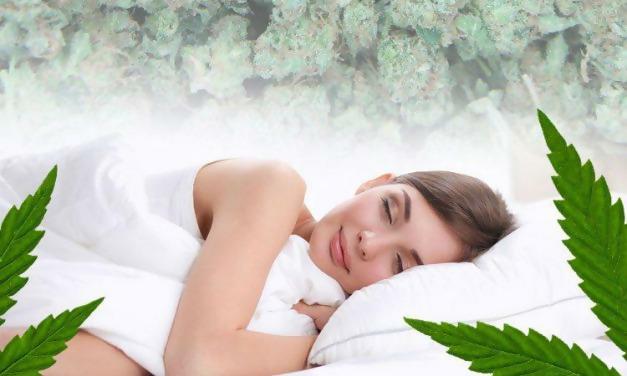Do you have trouble falling asleep or is your sleep continually disrupted by nightmares or breathing obstructions? If so, you are like 50 to 75 million other Americans who have some type of sleeping disorder. Mild sleeping disorders can sometimes be treated with natural remedies or lifestyle adjustments while more serious disorders may require the use of machinery such as CPAPs or prescription drugs that help induce sleep. However, these often have side effects, are difficult to manage, or can be addictive. If you suffer from lack of sleep due to a sleeping disorder and live in one of the states where medical marijuana is legal, you may be able to use cannabis as a treatment.?
What are Common Sleep Disorders?
Disorders that prevent or disrupt sleep can fall into a variety of categories. Some of these will resolve themselves over time while others require treatment. Some of the most common sleep disorders include the following:
- Excessive daytime sleepiness?Also known as hypersomnia, this is often caused by other sleep disorders such as insomnia or apnea.
- Central sleep apnea?This disruption in breathing during sleep occurs when the brain fails to signal the body to breathe.
- Obstructive sleep apnea?The result is the same as central sleep apnea, but obstructive sleep apnea is caused by the relaxation of throat muscles that disrupts the flow of oxygen.
- Parasomnia?Parasomnias include night terrors, sleepwalking confusional arousals, and nightmares.
- Periodic limb movement?This is also known as Restless Leg Syndrome and involves the urge to move the limbs while falling asleep or during sleep.
- Insomnia?Not being able to fall asleep is probably one of the most common sleep disorders and can be caused by sickness, anxiety, or a medical condition.
How do THC and CBD Affect Sleep?
The two mostly widely known and commonly studied chemicals in cannabis are THC and CBD. While THC is responsible for many of the psychoactive effects or the ?high? that most associate with marijuana use, CBD does not produce these effects. Regardless, both have their place when it comes to treating sleep disorders.?
Low doses of THC can have a calming effect and it?s been shown that strains of marijuana that are high in THC are sedative in nature. However, high doses of THC can cause anxiety and paranoia that can negatively impact sleep. CBD has been reported to increase alertness in some, especially when it is daylight or there are lights on in their home. Others find CBD to mildly sedative, especially during the night or when their homes are dark.?
In many individuals, a combination of both THC and CBD works best to treat their sleep disorders. THC can provide the sedation while CBD can curb the psychoactive effects that can lead to nightmares and paranoia. The only way to find out whether THC or CBD (or a combination of the two) is better for your sleep disorder is to try different strains for yourself and see which provides the most relief.?
Benefits and Side Effects of Using Marijuana for Sleep Disorders- Cannabis for Sleep
As a natural relaxer and antidote to stress, cannabis can help those who experience insomnia due to anxiety, worries at work or home, or during especially stressful periods in their lives. It can also help those who can?t fall asleep or can?t stay asleep due to chronic pain. Cannabis has also proven to be an effective treatment for post-traumatic stress disorder, a condition that often causes insomnia, nightmares, and night terrors. There have also been studies showing that medical marijuana can improve sleep apnea as THC mimics an endocannibinoid that improves this condition. THC can also act as a respiratory stabilizer and can modulate serotonin, both of which play a part in getting a restful night of sleep.?
Using cannabis to treat a sleep disorder does not come without side effects. Some of those who use marijuana to get to sleep can feel hangover symptoms in the morning that include lethargy, dry eyes, congestion, and fogginess. Others may find they do not get into deep REM sleep?the state where dreams occur?when they use marijuana before going to bed. When they stop using marijuana, they can experience an REM rebound effect where dreams are much more lucid, which can be a problem for those with nightmares or night terrors.?
How to Start Using Medical Marijuana to Treat Your Sleep Disorder – Cannabis for Sleep
If you?re at least 18 years old, have a diagnosed sleep disorder, and you live in a state where medical marijuana is legal, you may be able to get an mmj card that will let you purchase it legally from any licensed dispensary in the state. To get a card, you must first speak with an approved physician either in person or via a telehealth platform who can verify your condition and determine if medical marijuana is right for you. Scheduling, for example, an appointment for a New Jersey medical marijuana card online is made easy as doctors transition to telehealth options. If you are approved, you can then register and receive your card in the mail. This card is valid for one year. After that year, a medical marijuana card renewal is necessary which can be performed at the same place where you initially got your card.
Living with a sleep disorder can be very disruptive to your life and to your health. If you would like to explore cannabis as a possible treatment option, contact our doctors today to see if you qualify.

